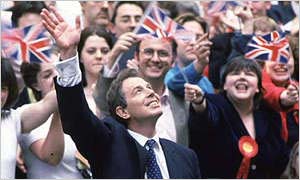In 2005, Tony Blair was told by Charles Trevail that some personal polling had been carried out about the then Prime Minister. They had, Trevail said, never seen personal polling like it: there was virtually no indifference. Everyone had a strong opinion, and they were totally divided. You either loved him, or hated him.

It wasn’t division of the type Thatcher inspired, either. That was about policy. This was personal. You either loved him, or hated him.
For Blair to have that sort of personal effect on people makes it difficult to assess his time at the top of British politics properly. Those who despise him will wilfully ignore his remarkable achievements, both electorally and in policy, while those who adore him will excuse terrible misjudgements, both in office and since.
But it would be wrong to allow the 20th anniversary of his election as Labour leader pass unmarked.
Tony Blair is, after all, Labour’s most successful ever leader.
Such is the level of hostility that even this is occasionally disputed. Harold Wilson, some will contend, was a more successful leader, winning four general elections compared to Blair’s pitiful three. However, Wilson, although a very good Labour leader in very many ways, only returned one workable majority: 96 in 1966. His other election successes returned majorities of four, three and minus fourteen.
Blair is not only the first Labour leader to win three elections in a row, he is the only Labour leader to win more than one workable majority, ever.
It was this unprecedented success that won Blair respect and, yes, even support from some unlikely figures. In his autobiography, Blair describes Dennis Skinner as one of his “best supporters”: “He didn’t agree with any of my policies, but he liked someone who whacked the Tories.”
Perhaps we should bear that in mind when we think about Blair’s legacy as leader. Because the winning wasn’t all for nothing. There is plenty in there that the left (both inside and outside of Labour) happily celebrate, but cannot bring to associate with his name.
When we campaign to save the NHS now, on its own 60th anniversary, it is an NHS that was on the brink of collapse when Blair came to power. It was that Labour Government that invested more in the health service than ever before, that trained more nurses and doctors than ever before. The same goes for the Sure Starts we want to keep open and the millions of children we want to protect from the real threat of poverty.
Tories love to throw about the stat that unemployment is always higher at the end of a Labour Government than at the beginning. When Blair left office in 2007, unemployment was lower than when he began. There had been ten years of uninterrupted economic growth. It was the first Government to see crime fall since the war. Whether inequality had risen or not depends how you want to measure it (John Rentoul makes a convincing case that it did not), but on average, people were better off.
What we have seen since 1994 is an evolution of UK politics. The Labour Party now expects to react to a thumping election defeat by winning the next one. Meanwhile, after twenty years of living in it, the Conservative Party are still trying to adjust to the post-Blair world: they are now a party that extends LGB rights, supports raising the minimum wage and yet has no idea where its next majority is going to come from.
Overall, it was a good Government. He was a good Prime Minister. Tony Blair was a good leader of the Labour Party. I know, I know, there is plenty to argue about. But for the Labour Party to move forward from New Labour, it will at some point have to come to terms with that.
To do that,we have to separate Tony Blair, the Labour leader, from Tony Blair, the man. Separate the wealth, the friends, the foreign states he now chooses to advise, the things you think he could have done better as PM, even separate foreign policy (which he tried to sell as Blair the man, under his own conviction) and consider this: was the UK was better or worse for him being elected Labour leader?
Blair says the difference between him by the end of his time as Labour leader from the beginning is that: “‘Being in touch’ with opinion was no longer the lodestar. ‘Doing the right thing’ had replaced it.”
For all Tony Blair changed the Labour Party, I think this proves that after thirteen years in the job, being Labour leader rubbed off on him too.




More from LabourList
Almost half of Labour members oppose plans to restrict jury trials, poll finds
‘How Labour can finally fix Britain’s 5G problem’
‘The University of the Air – celebrating 60 years of Harold Wilson and Jennie Lee’s vision’